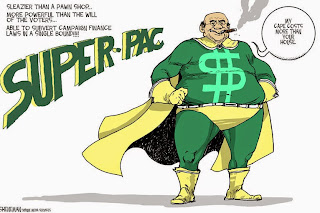The BBC asked in one of their
recent programs - "America does not even like football, or so many
people think. Why is it leading the charge against alleged Fifa
corruption?"
Good question.
At
dawn, Swiss police rounded up seven Fifa officials at the behest of US
authorities who have conducted a massive investigation into corruption
at football's governing body.
So how did a country where football is more niche than entrenched come to police the world's beautiful game?
"Too many countries are cowed by Fifa," said Alexandra Wrage, a former Fifa anti-bribery adviser who resigned in protest from the organization.
"As with international bribery more generally, the US Department of Justice has said they'll step up to investigate corruption if others won't," she said.
It is not clear what specific event - if any - prompted the US investigation. Some have pointed to the United States' failed bid in late 2010 to host the the 2022 World Cup, and suspicions that bribes were paid to encourage votes for Qatar.
Note EU-Digest:The US involvement in Fifa is questionable and looks much more like politics gone on steroids. Everyone is aware bribery in sports has been going on for years now, not only in the FIFA globally, but also in just about every sector of US sports. Another possible point of this US contention could be that Russia will be hosting the next World Cup in 2018! The country submitted its candidacy in early 2009 and was selected by the FIFA Executive Committee in Zurich on December 2, 2010, beating out England and joint bids from Portugal/Spain and Belgium/Netherlands.
Who knows, the US might be wanting to turn this decision for Russia to host the 2018 world cup around by proving bribery charges favored the selection of Russia and in that way indirectly also punish Russia for the Ukraine crises.
Another aspect, and maybe the most important one, is that the commercial benefits of hosting a World cup and all the perks that come with it involves major corporate involvement and profits.
This complicates matters even more, since corporate money these days, more often than not, usually controls political action.
EU-Digest
Good question.
So how did a country where football is more niche than entrenched come to police the world's beautiful game?
"Too many countries are cowed by Fifa," said Alexandra Wrage, a former Fifa anti-bribery adviser who resigned in protest from the organization.
"As with international bribery more generally, the US Department of Justice has said they'll step up to investigate corruption if others won't," she said.
It is not clear what specific event - if any - prompted the US investigation. Some have pointed to the United States' failed bid in late 2010 to host the the 2022 World Cup, and suspicions that bribes were paid to encourage votes for Qatar.
Note EU-Digest:The US involvement in Fifa is questionable and looks much more like politics gone on steroids. Everyone is aware bribery in sports has been going on for years now, not only in the FIFA globally, but also in just about every sector of US sports. Another possible point of this US contention could be that Russia will be hosting the next World Cup in 2018! The country submitted its candidacy in early 2009 and was selected by the FIFA Executive Committee in Zurich on December 2, 2010, beating out England and joint bids from Portugal/Spain and Belgium/Netherlands.
Who knows, the US might be wanting to turn this decision for Russia to host the 2018 world cup around by proving bribery charges favored the selection of Russia and in that way indirectly also punish Russia for the Ukraine crises.
Another aspect, and maybe the most important one, is that the commercial benefits of hosting a World cup and all the perks that come with it involves major corporate involvement and profits.
This complicates matters even more, since corporate money these days, more often than not, usually controls political action.
EU-Digest




